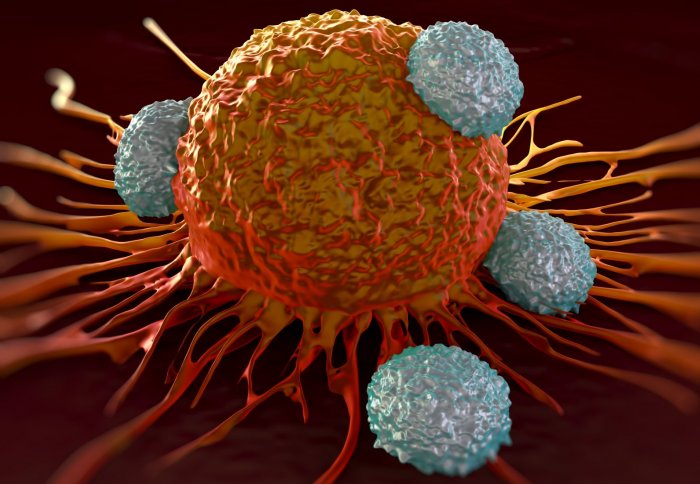A lead candidate for immunotherapy may increase tumour growth in certain cancers

Boosting a part of the immune system known to have anti-tumour properties may actually help tumours grow in cancers linked to chronic inflammation.
Cancer immunotherapies boost aspects of the body’s normal immune system, to help fight tumours. They are part of a fast-evolving field of research and medicine, with several types of immunotherapies currently in clinical trials.
Now, a research team at Imperial College London has found that in a mouse model developing liver cancer, one immunoreceptor - attractive candidate for immunotherapies – promoted rather than delayed tumour growth.
What is beneficial in fighting one type of cancer might have the opposite effect in another. We need to be more precise when administering a chosen therapy to a particular type of cancer.
– Dr Nadia Guerra
The researchers believe this could have implications for the effectiveness of immunotherapy in combating human cancers caused by inflammation, such as some liver and colon cancers. The study, funded by the Wellcome, Trust was published in Nature Communications earlier this year.
Lead author Dr Nadia Guerra from the Department of Life Sciences at Imperial, said: “Immunotherapies have shown unprecedented successes in treating cancer patients with advanced forms of cancer, especially metastatic melanomas. These therapies are now being tested in various type of cancer and novel combination approaches are being developed at a very fast pace.
“Nonetheless, there are still challenges ahead to optimise those therapies and reduce adverse effects. Scientists and clinicians are working at identifying cancer patients that would benefit the most from those therapies to increase success rates and hopefully achieve complete remission.”
How immunotherapies tackle cancer
The part of the immune system involved in the study is called NKG2D (Natural Killer Group 2 member D). NKG2D is a type of immunoreceptor – a molecule present on the surface of the body’s immune cells that recognises signals from normal cells that are distressed.
For example, if a normal cell is infected with a virus, it will display molecules on its surface that the NKG2D immunoreceptor can detect. The immune cell then directs a lethal hit that destroys the infected cell.
Dr Guerra first showed ten years ago that this mechanism also works against cancerous tumours – demonstrated by the fact that tumours grew faster in mice that had their NKG2D activity supressed.
However, NKG2D contributes to inflammation and has been found to play a role in chronic inflammatory disorders, such as Crohn’s disease. In this case, the NKG2D misfires and attacks normal cells instead of damaged ones.
The paradoxical effect of inflammation
The team looked into whether NKG2D’s roles in chronic inflammation and cancer could help tumours to grow in these types of cancer.
To do this, they used a mouse model of liver cancer driven by inflammation. Human and mouse NKG2D receptors are very similar, so the results are thought to be relevant to human liver cancers.
They found that the tumours actually grew faster in mice with functional NKG2D than in mice that lacked NKG2D. Dr Guerra said: “NKG2D is a potent anti-tumour agent, but we have found that it might actually have the opposite effect in tumours that arise and/or grow from a background of chronic inflammation.”
In these environments, the liver tissue undergoes cycles of damage and repair continuously as it is fought by NKG2D, making the cells more at risk of developing genetic mutations.
Dr Guerra said: “The paradoxical effect of NKG2D we discovered exposes the need to selectively target the types of cancer that will benefit from NKG2D-based immunotherapy. What is beneficial in fighting one type of cancer might have the opposite effect in another.
“We need to be more precise when administering a chosen therapy to a particular type of cancer. Our data unravels a conceptual shift that will inform which cancer these new therapies can benefit the most, and help match the best therapy to each patient.”
-
'The immunoreceptor NKG2D promotes tumour growth in a model of hepatocellular carcinoma' by S Sheppard et al is published in Nature Communications.
Article supporters
Article text (excluding photos or graphics) © Imperial College London.
Photos and graphics subject to third party copyright used with permission or © Imperial College London.
Reporter
Hayley Dunning
Communications Division